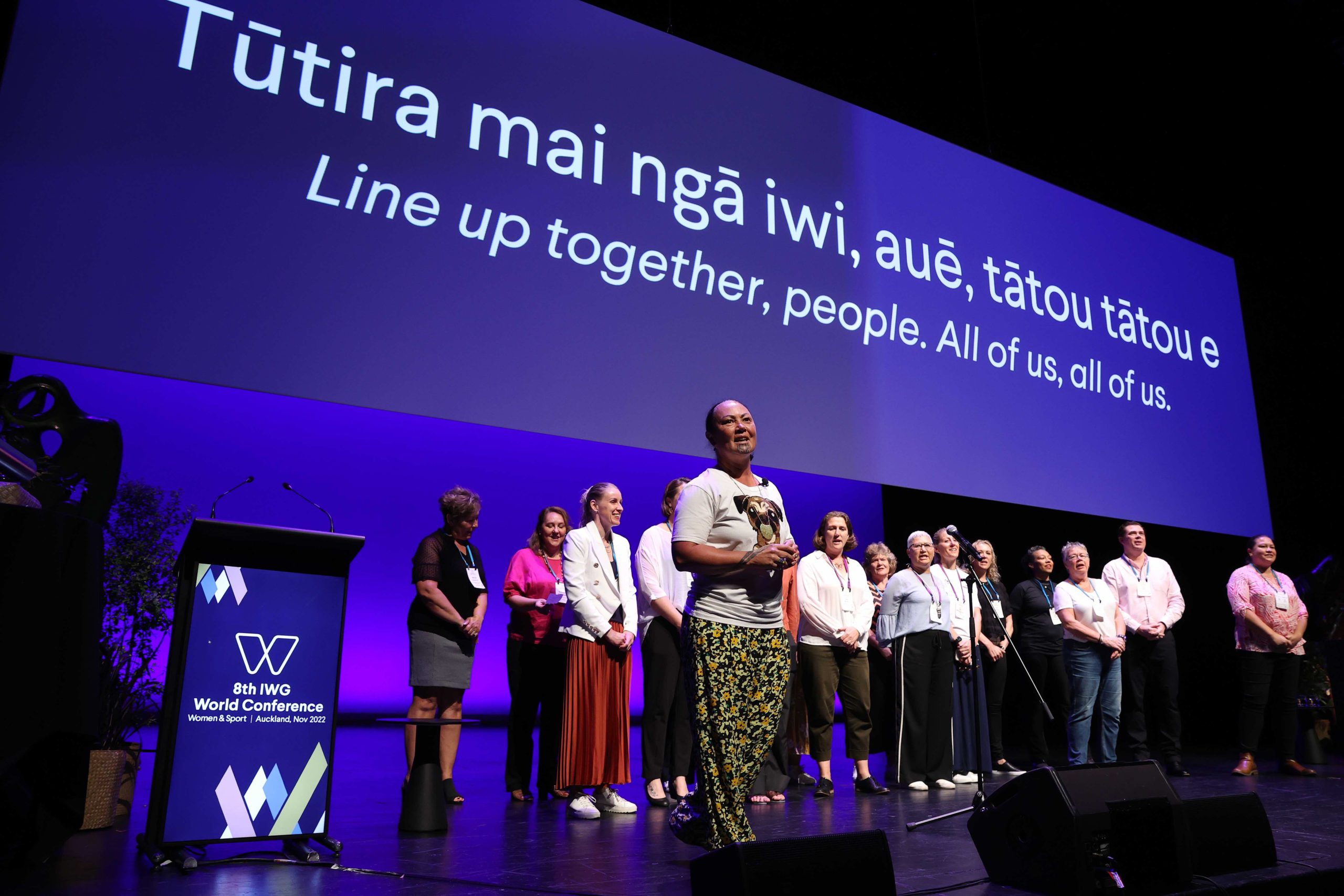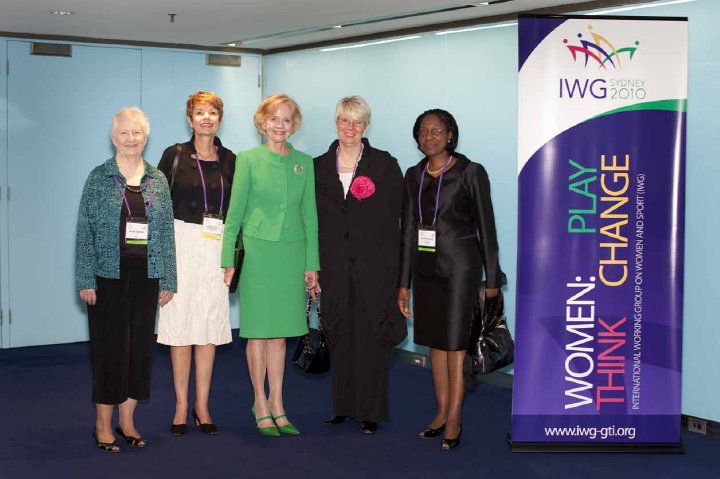The International Working (IWG) on Women & Sport was established in 1994 and since then, has become a leading light for the ‘women in sport’ movement worldwide. Every four years, the Secretariat and World Conference move to a new host nation. One of the key aims of each Secretariat is to leave a legacy – something that supports future development of the IWG and represents the work of the host nation. Here is a history of all past legacies:
Auckland, New Zealand (2018-2022)

AUCKLAND, NEW ZEALAND – NOVEMBER 15: Welcome during the 8th IWG World Conference on Women & Sport at Aotea Centre on November 15, 2022 in Auckland, New Zealand. (Photo by Fiona Goodall/Getty Images for WISPA)
“Change Inspires Change”.
Between 14-17 November 2022, the 8th IWG World Conference on Women & Sport took place in Tāmaki Makaurau Auckland, Aotearoa New Zealand and online. The conference brought together over 1,850 participants from around the world, the largest conference to date. The New Zealand Secretariat developed 10 global legacy items including a refreshed IWG brand, global communities of practice, a user-generated collection of resources, toolkits and insights to support the global sector in advancing gender equity with the launch of the Insight Hub. Learn more about their global legacies here.
Gaborone, Botswana (2014-2018)

“Determine the future, be part of the change”.
Between 17-18 May 2018, the 7th IWG World Conference on Women & Sport took place in Gaborone, Botswana. Botswana’s legacy was introduced as, “the Big 5”, a set of five key strategic actions, each with an animal symbol, that the Secretariat sees as a necessary focus point to take advantage of the cultural wave demanding women’s rights, respect, and fairness in sport. “The Big 5” draws inspiration from Botswana’s biggest tourist attractions: the wild animal life. The implementation of the IWG Botswana Big 5 Legacy seeks to improve access to sports for women of all identities, cultures, backgrounds and experiences, improving their individual lives and the inclusiveness of their communities. Download to read more!
Helsinki, Finland (2010-2014)

“Lead the change, be the change”.
From 12-15 June 2014, more than 800 delegates from close to 100 countries attended the 6th IWG World Conference on Women & Sport in Helsinki, Finland. Along with reaffirming the Brighton Declaration, originally launched in 1994, the Secretariat also approved an updated version, to embrace physical activity as an essential extension of organised sport, especially for girls and women. Take a look at Helsinki’s legacy the extended Brighton Plus Helsinki 2014 Declaration on Women and Sport. You can find out more about the Brighton Declaration today by visiting here.
Sydney, Australia (2006-2010)

“Women: Play, Think, Change.”
From 20 – 23 May 2010 the 5th IWG World Conference was held in Sydney, Australia – the first conference to be held in Oceania. Australia’s legacy was called the “Sydney Scoreboard” and it was focussed on increasing the number of women on boards and management committees of all sport organisations at the local, regional, and international level. The “Sydney Scoreboard” took form on a web-based scoreboard operating as a powerful online tool through which women in leadership roles within sporting organisations can be tracked both nationally and internationally in real-time.
Kumamoto, Japan (2002-2006)

“Participating in Change”.
From 11-14 May 2006, the 4th IWG World Conference was held in Kumamoto, Japan. “The Kumamoto Commitment to Collaboration” is the legacy of the conference that presents a visual display of Asian characters symbolising Kumamoto Commitment to building a network with relevant agencies and individuals that realise gender equality in and through sport. View the Kumamoto Commitment to Collaboration here.
Montreal, Canada (1998-2002)

“Investing in Change”.
The 3rd IWG World Conference on Women & Sport was held in Montreal, Canada from 16-19 May 2002 under the overall theme: “Investing in Change”. “The Montreal Tool Kit” legacy presented at the world conference contained a collection of materials and ideas for increasing sport opportunities for women and girls. The toolkit highlights four key tools that contribute too, “Investing in change”: (1), Tools for advocating change; (2), Tools for Changing Organisations, Systems and Structures; (3), Tools for Individual Development; Lastly (4), Tools for Action. Click here to view the Montreal Toolkit.
Windhoek, Namibia (1998)

“Reaching out for Change”.
The 2nd IWG World Conference on Women & Sport was held in Windhoek, Namibia from 19-22 May 1998 under the overall theme ”Reaching out for Change”. The conference took place at the end of the secretariat quadrennial in the United Kingdom (see below). “The Windhoek Call for Action” legacy is a set of strategic actions sent throughout the world to further the development of equal opportunities for girls and women to participate fully in sport. This call reflected an overwhelming desire on the part of all delegates to seek greater co-operation and co-ordination between the many agencies and organisations responsible for women’s issues, and recognised and stressed the importance that sport can and should play in the advancement of girls and women. View the The Windhoek Call for Action here.
Brighton, United Kingdom (1994-1998)

“Women’s Sport and the Challenge of Change”.
The 1st IWG World Conference on Women & Sport held in Brighton, UK from 5-8 May 1994, brought together policy and decision makers in sport at both national and international level. The Brighton conference marked the beginning of a strategic and coordinated international effort to bring about women’s equality in sport. The “Brighton Declaration on Women and Sport” is the first legacy endorsed to provide the principles that should guide action intended to increase the involvement of women in sport at all levels and in all functions and roles. It was updated in 2014 by the Helsinki Secretariat and can be viewed here.